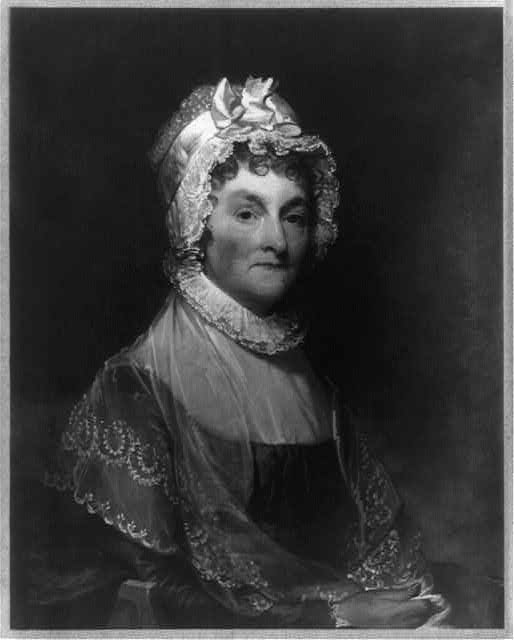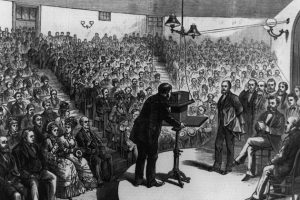Too often in society women are belittled because of their gender, despite their numerous abilities and achievements. Women all over the world fall victims, and struggle to become survivors, of inequality against their male counterparts. Although some improvements have been made over time, there is still much progress to be done in order to establish an equality between men and women in all aspects of life, not just in a few token areas. During the eighteenth century, a few women became advocates for women’s rights and fought for individual freedoms that were attainable for men but rarely for women. One of these advocates was Abigail Adams, first lady to the second President, John Adams. Abigail, a devout wife and American citizen, was more than just a first lady to the president. She was an early feminist voice who refused to stand by and allow women to be suppressed of their capabilities and their rights.
In order to comprehend why Abigail felt so strongly and fought so vigorously for her beliefs, it is important first to understand how her beliefs became rooted. Abigail was the second out of four children from William Smith and Elizabeth Quincy. Her father was a minister of North Parish Congregational Church of Weymouth in Massachusetts colony; her mother Elizabeth was a typical housewife and mother. Abigail was fortunate enough to be born into such an eminent family in New England with a prosperous lineage of statesman, ministers, and merchants. She was raised in a household that wholeheartedly affirmed the beliefs of rational Puritanism, a solid Christian faith, and a strong education.1

From an early age, Abigail was introduced to the limitations of women by being unable to attend school. Growing up in the eighteenth century, education was highly sought after; however, education was primarily for boys, not girls. Boys had the opportunity to study various subjects, such as Latin, math, French, literature, and Greek. Elite families often prepared their boys to receive a higher education, either at Harvard College or abroad. Since girls were not permitted to attend school, Abigail was educated at home. Though her education did include some rudimentary training in academic areas such as reading and writing, most of her education focused on becoming a traditional housewife and mother. She observed her mother in common domestic skills such as sewing, cooking, and home maintenance.2
Her most significant influence occurred around the time of the Revolutionary War, which was a time of extreme stress and chaos for the young republic. This was a time when participation of every American became absolutely imperative in order to win not only the war, but also to restructure the country afterwards. Despite the circumstances, the social conditions for women went largely unchanged. During the Revolutionary War, while many of the men were away serving the war effort, the women were left in charge of the businesses and farms. The towns and cities were left with impoverished women who were often driven to lead protests and riots against price increases, as well as resorting to looting for food. In other parts of the country, women began to fight back against British troops, whom they were forced to quarter during the war. Some women either by choice, force, or desperation, traveled to the Patriot army camps to live with their male relatives.3
After the women began migrating to the camps, many men became hostile and voiced brutal complaints against the women. One man even expressed a barbarous comment about women, claiming “their falling, their brows beady with the heat, their belongings, slung over one shoulder, chattering and yelling in sluttish shrills as they went.”4 George Washington himself even believed the females to be disruptive and a distraction to the troops. In reality, women were actually a great asset and made major contributions towards the war effort. Most women performed domestic duties such as cooking, laundry, nursing, and even boosting the morale of the soldiers. Some women went beyond the normal expectations and became involved in the combat.5
By the end of the war, the views and standards of women had remained the same as at the outset. Many women began to question their place in society, including Abigail Adams. As early as March 31, 1776, while her husband was in Philadelphia forming a new government, Abigail wrote a letter to her husband, John, imploring him to expand women’s rights to become equal with the rights of men:
I long to hear that you have declared an independancy—and by the way in the new Code of Laws which I suppose it will be necessary for you to make I desire you would Remember the Ladies, and be more generous and favourable to them than your ancestors. Do not put such unlimited power into the hands of the Husbands. Remember all Men would be tyrants if they could. If perticuliar care and attention is not paid to the Laidies we are determined to foment a Rebelion, and will not hold ourselves bound by any Laws in which we have no voice, or Representation.6
Abigail was making her purpose clear and made sure it was known that women would no longer stand for unfair and unjust treatment.

Abigail continued to fight for the rights of women for the rest of her life. Although she was most known for her strong tone in her letters, she was also a major advocate for the right of education for women. Abigail became one of the most literate and politically-powerful women of her time.7 Her ideals, courage to voice her intellectual opinions, and ability to stand up for her beliefs is what established the main attraction between her and John. Abigail was able to maintain the perfect image of the domestic housewife, mother, and First Lady to the President of the United States. Abigail tread a path for women which is still being followed today. Hopefully her beliefs and visions for the equality of women will one day come true.
- Salem Press Biographical Encyclopedia, 2016, s.v. “Abigail Adams” by Mary E. Virginia. ↵
- Salem Press Biographical Encyclopedia, 2016, s.v. “Abigail Adams” by Mary E. Virginia. ↵
- Alan Brinkley, American History: Connecting with the Past Volume 1, 15 edition (New York: McGraw-Hill Education, 2015), 147. ↵
- Brinkley, American History: Connecting with the Past, 147. ↵
- Brinkley, American History: Connecting with the Past, 147. ↵
- Abigail Adams, “Abigail Adams’ Letters to John Adams March 31, 1776,” Adams Family Papers: An Electronic Archive. Massachusetts Historical Society. http://www.masshist.org/digitaladams/. ↵
- Salem Press Biographical Encyclopedia, 2016, s.v. “Abigail Adams” by Mary E. Virginia. ↵



85 comments
Marissa Gonzalez
Women like Abigail promote the equality of women which is organized very well in this article. It is interesting how she was not as fortunate to receive an education at a younger age; however, she is known as one of the most literate women in her time. America today still has issues with the equality of women and it is amazing how Abigail was one of the women to help aid future women in standing up for their rights.
Aaron Jaramillo
Very well written article. I have to agree with Andres and link Mrs. Adams to the current first lady Michelle Obama. Both while in the house fought and sought for women right and equality. Well done on the article. I can’t wait to read more from you.
Jacob Hall
Its funny how we never really come to think about first lady and the roles she plays in shaping the views of the country. Another thing that we don’t really come to think about is the women who were at home while the men were at war. we tend to forget the hardships they face and the responsibilities that they are forced to take on while the men were away. Its for these reasons that I find it sad that women were treated so unjustly, and why I agree with Abigail’s view that women should no longer be treated unequal to men.
Maalik Stansbury
I agree with the commenter, no one truly goes into the amount of detail you went into about his wife. I think you did a wonderful job, that made me more interested in this topic. I love how you explained and described Abigail and how she was. I realy on had a little bit of knowledge about her but now that has changed. Thank you.
George Manzanares
More often than not, people tend to overlook the first lady and focus solely on the president. It just goes to show how sexist society continues to be. recently, as seen with Michelle Obama, people began to see the impact of the first lady. Michelle as well as other key figures such as Eleanor Roosevelt play a crucial role to American society. Well done on illustrating the early efforts of feminism with Abigail Adams. She had a huge influence on American society despite her lack of recognition!
Tina Valdez
I truly enjoyed reading your article. I have always had a great amount of respect for Mrs. Adams, but your article reminded me of why my respect for her was born. Her astounding intellect is more than obvious when reading her letters. I was not aware that when the women joined the men at the Patriot army camps that even George Washington had found the women disruptive. The domestic duties they completed went a long way and to see women step in to combat the way they did is incredible; I love that you included all of that information in your article.
Andres Palacios
Excellent well written and informative article. I can relate a lot Abigail Adams a lot with Michelle Obama, two first ladies who have used their time in white house to promote women’s rights and equality.
Kassandra Guillen
This is a very well written and information filled article. It is always quite interesting to learn about the background of those who have had a great impact on history like Abigail Adams and her influence on women’s rights. It is fascinating that the written word was more effective for Abigail at this time in comparison to spoken words at events and gatherings. The primary source of the written letter by Abigail Adams to John Adams was a very impressive edition within your article. Well done!
Analina Devora
This article is very organized. I enjoyed your first paragraph, it really gave the reader an insight on how passionate you are about this topic. I also loved that you included a letter Adams herself wrote. It makes this article that much more special. Very well done.
Aurora Torres
Enjoyed your article, I find it so interesting that woman rights goes even further. No matter what, woman wanted to be equal as men. And that is still happening today we just want to be heard and be treated fairly. I never knew about Abigail Adams until today. She was a strong women who stuck to her beliefs, her letter to husband was strong in words and I really do admire her for sticking up to the woman. Great article.